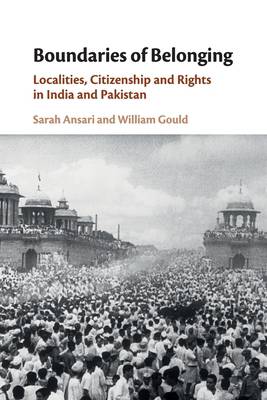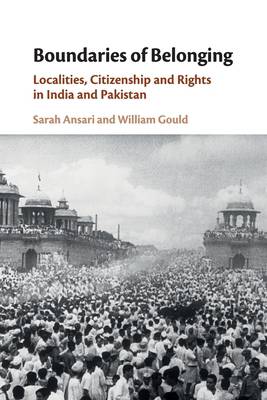
Je cadeautjes zeker op tijd in huis hebben voor de feestdagen? Kom langs in onze winkels en vind het perfecte geschenk!
- Afhalen na 1 uur in een winkel met voorraad
- Gratis thuislevering in België vanaf € 30
- Ruim aanbod met 7 miljoen producten
Je cadeautjes zeker op tijd in huis hebben voor de feestdagen? Kom langs in onze winkels en vind het perfecte geschenk!
- Afhalen na 1 uur in een winkel met voorraad
- Gratis thuislevering in België vanaf € 30
- Ruim aanbod met 7 miljoen producten
Zoeken
Boundaries of Belonging
Localities, Citizenship and Rights in India and Pakistan
Sarah Ansari, William Gould
Paperback | Engels
€ 50,45
+ 100 punten
Uitvoering
Omschrijving
The 1947 Partition had a major impact on issues of citizenship and rights in India and Pakistan in the decades that followed. Boundaries of Belonging shows how citizenship evolves at a time of political transition and what this meant for ordinary people, by directing attention away from South Asia's Partition 'hotspots' - Bengal and Punjab - to Partition's 'hinterlands' of Uttar Pradesh and Sindh. The analysis, based on rich archival research and fieldwork, brings out commonalities, differences, and the mutual co-construction of the 'citizen' in both places. It also reveals the way in which developments across the border, such as communal violence, could directly impact on minority rights in its neighbour. Questioning stereotypes of an increasingly 'authoritarian' Pakistan and 'democratic' India, Sarah Ansari and William Gould make a major contribution to recent scholarship that suggests the differences between India and Pakistan are overstated.
Specificaties
Betrokkenen
- Auteur(s):
- Uitgeverij:
Inhoud
- Aantal bladzijden:
- 336
- Taal:
- Engels
Eigenschappen
- Productcode (EAN):
- 9781316647172
- Verschijningsdatum:
- 27/10/2022
- Uitvoering:
- Paperback
- Formaat:
- Trade paperback (VS)
- Afmetingen:
- 152 mm x 229 mm
- Gewicht:
- 449 g

Alleen bij Standaard Boekhandel
+ 100 punten op je klantenkaart van Standaard Boekhandel
Beoordelingen
We publiceren alleen reviews die voldoen aan de voorwaarden voor reviews. Bekijk onze voorwaarden voor reviews.









